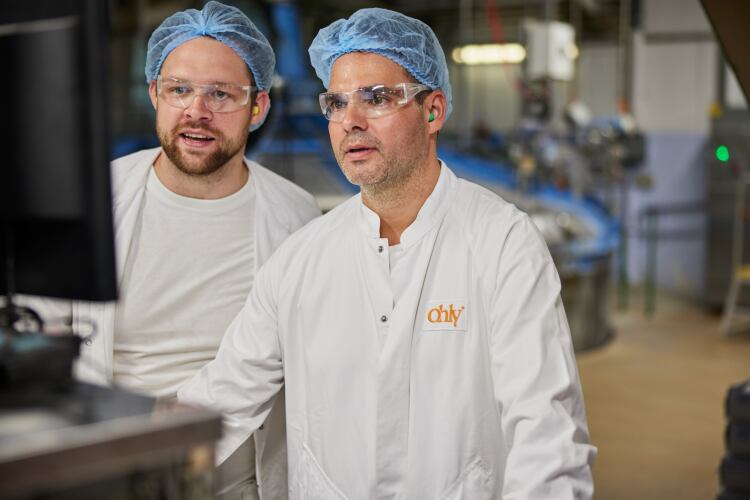Sustainability is a ‘key theme’ for food ingredient suppliers with a ‘significant focus’ now placed on ‘reducing their end-to-end carbon footprint across the supply chain’, according to forecasters at Research and Markets.
It is also a topic high up the consumer agenda. While food prices are currently dominating the headlines, shoppers remain concerned about climate change. In the UK, for instance, Kantar reveals that around half of shoppers want to cut their carbon footprint.
Hamburg-based ingredient supplier Ohly, part of ABF Ingredients, is witnessing this shift first-hand. The yeast extracts and flavours group has seen growing customer awareness of the carbon footprint of ingredients, according to Jan Bebber, global platform director for new business. “In the last months and years, we have received increasing requests from customers to find out more about our carbon footprint,“ he told FoodNavigator.
Internally, the company has also become more aware of its responsibility to lower greenhouse gas emissions linked to its operations. "As a company and team, we sincerely believe that it is the right thing to take action in order to do our part to mitigate the climate crisis," Bebber continued.
This has prompted Ohly to launch its first carbon-neutral ingredients, a product offering that the company unveiled alongside a longer-term commitment to transition its operations to a net-zero footing by 2030.
Achieving carbon-neutral certification
In order to launch its first carbon neutral ingredients, Ohly is investing in offset projects that balance out the carbon emissions produced during their manufacture. While this is distinct from delivering a net-zero product – which means no carbon emissions were emitted from the get-go – achieving carbon neutrality is an important step in the journey to draw down emissions, we were told.
To this end, Ohly has invested in two certified carbon offsetting projects.

"Our criteria when determining the projects combined certified impact with local activity. Consequently, the projects identified by our carbon partner, ClimatePartner are located in Germany and USA," Bebber explained.
“Innovative technological solutions hold the key to reducing carbon emissions. To compensate unavoidable emissions relating to our products, we are supporting a project that helps provide clean energy by installing landfill gas collection. This gas is turned into heat to help supply clean energy to pulp and paper milling in the USA. This avoids methane flaring into the atmosphere and reduces carbon emissions,” he detailed.
Meanwhile, to support local communities in north Germany where the company is located, Ohly selected a project that protects the Rostock city forest, which stores ‘vital amounts’ of carbon, nitrous oxide, and methane. “The project helps regulate the water balance and preserve a habitat for rare species,” the business development expert added.
These two projects combined save the amount of carbon equivalent to currently ‘unavoidable’ emissions that occur during the sourcing, production, and distribution of Ohly's first three carbon-neutral products - powerful natural yeast ingredient OHLY FLAV-R-MAX, classic yeast extract OHLY FLAV-R-BASE 19 and yeast-based bionutrient ingredient X-SEED KAF.
These ingredients already have strong sustainability stories. Targeting innovators in the lower-footprint plant-based space, FLAV-R-MAX delivers a ‘high umami impact’ that masks off-notes of plant proteins and serves as a solution for salt reduction in meat alternatives, while FLAV-R-BASE 19 balances overall flavour with a savoury taste and masks off-notes in vegan dairy applications. Bionutrient ingredient X-SEED KAF, meanwhile, provides key nutritional components for maximising batch outputs of microbial fermentations. This helps Ohly’s customers in cultures, probiotics and biopharma meet their carbon reduction targets by producing more with less.

"Ohly’s carbon-neutral products act as enablers, allowing our customers to transparently account for the associated emissions in their supply chain and help them to reduce their own emissions. This is being driven by their own ambitions and in response to heightened interest from consumers on the wider environmental impact of their products. As such our work in this area, and particularly by offering carbon-neutral products, is a key step in helping our customers differentiate their products in the market,“ Bebber believes.
These products are the first step on Ohly’s journey to build a broader portfolio of carbon neutral products for their customers with the ambition of ultimately bringing net zero ingredients to market, the company stressed.
Ohly’s net zero roadmap
Indeed, the German ingredient manufacturer is working to shift its operations to net zero emissions by 2030. This target covers scopes 1, 2 and 3, Bebber confirmed. “Ohly’s is focused on actions which we can demonstrate have positive impact over the medium-term as well as aligned with our long-term ambition. While we have our plan of activities to deliver emission reductions for our site, we also require others to work alongside us to transform production models, and for a reshape of national energy policies by governments,“ he elaborated.
Kicking off efforts to decarbonise operations at their Hamburg site, Ohly has worked alongside carbon reduction experts at ClimatePartner to measure the total end-to-end emissions across their Hamburg value chain. Understanding this broader picture has enabled Ohly’s teams to develop a ‘comprehensive’ decarbonisation roadmap that includes measures to avoid, reduce and offset the emissions created during the production of their yeast-based products.
And progress has already been made. Since 2018, Ohly has reduced its CO2 footprint by 25% for every kilogram of product output. This was achieved through ‘targeted investments’ and process optimisation.
Carbon-saving activities are already being implemented, such as the group’s switch to 100% renewable electricity at the beginning of 2022, and Ohly expects progress to accelerate. The group estimates that in 2023 there will be around a 45% carbon emissions reduction per kilogram of product manufactured in Hamburg compared with 2018.
Further measures will be brought online by 2030 leading to reduced energy consumption and decreased use of raw materials, the company predicted.
"It is Ohly’s ambition to reduce reliance on offsets and we are focused on taking measures to avoid and reduce emissions across our production processes. Ultimately, we look to offset unavoidable emissions through recognised carbon offset projects which contribute to climate action. Our measures to reduce emissions include: switching to the use of 100% renewable electricity; projects to remove the need for natural gas; and engaging with our suppliers to align on carbon reduction plans," Bebber concluded.




